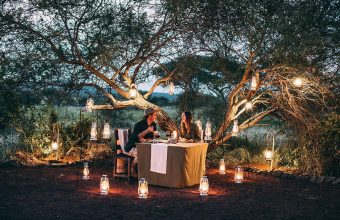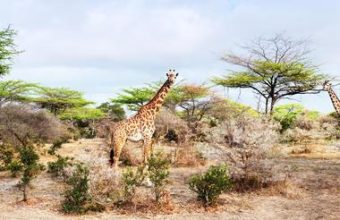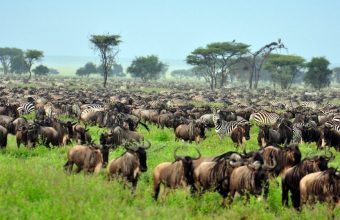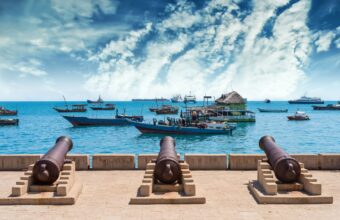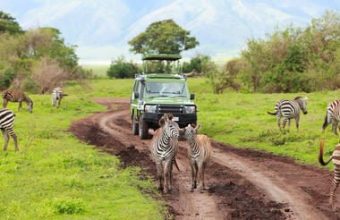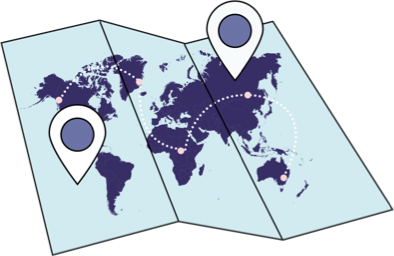How to book a Tanzania safari
An essential guide to planning and booking a safari in Tanzania
There's no denying it, a safari anywhere is an expensive trip – and a safari in Tanzania is at the pricier end of the spectrum. When you're coming this far and spending this much, you'll want everything to be just right.
But with so much to weigh up (and with much dubious advice to be found online), planning and booking a safari can feel a little daunting. Start by deciding where and when you want to go, then you can drill down into the finer details.
Camping safari or lodge? Group vs private tour? National park or private reserve? A lot of these questions are a function of your budget, but feat not, we've got you covered – read on.
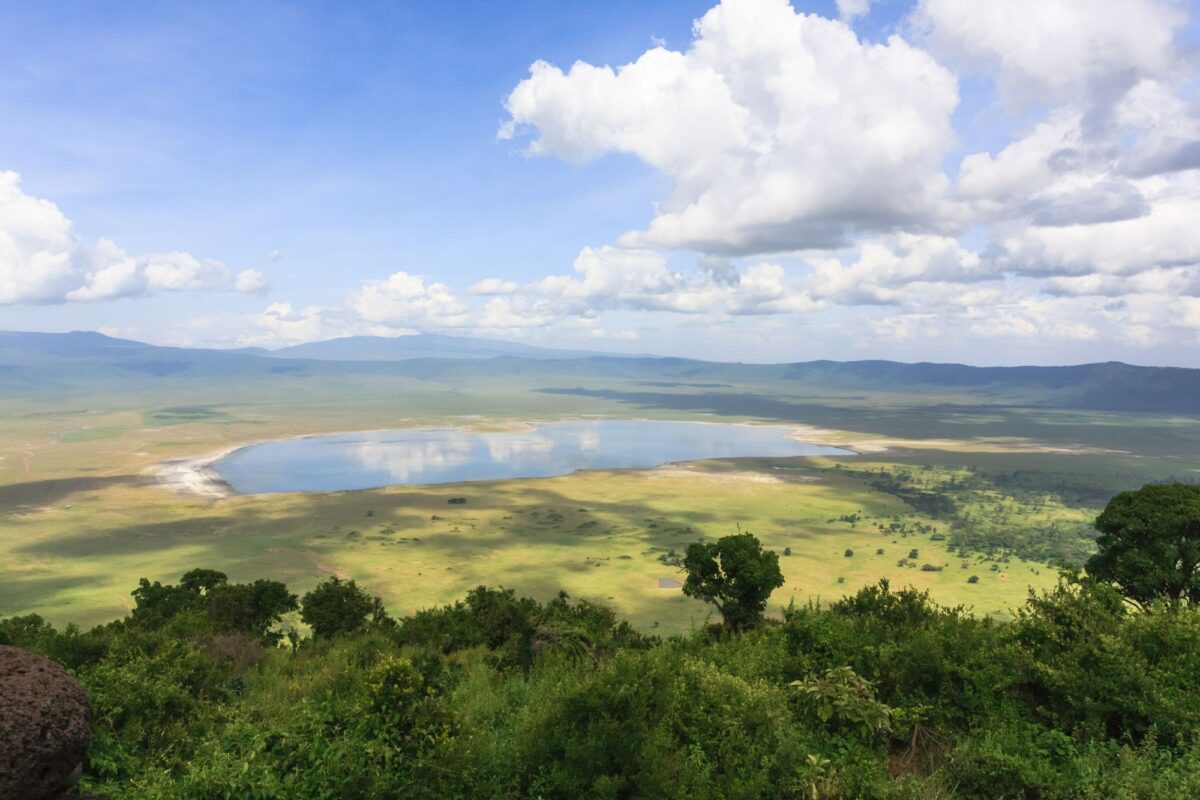
The classic view of Tanzania's Ngorongoro Crater
How to book a safari in Tanzania
Everything you wish you'd known before you booked
How many days do you need for a Tanzania safari?
If you’re travelling from Europe or further afield, aim for at least a week. A typical two-stop safari trip might be three nights in the Serengeti and three nights in the Ngorongoro Conservation Area – three nights tends to be more relaxed than two which only gives you one full day at a camp. Account for a possible overnight in Nairobi or Dar es Salaam, depending on your international flights.
Ten days to two weeks is a good amount of time if you’d like to add on a beach break in Zanzibar and if you’re thinking of travelling further afield around the country – for example, combining the north and the south, or adding a chimp trekking experience.
For a Kilimanjaro summit, you’ll need at least a week factoring in arrival and departure days, and up to 12 days depending on the route you take – remember the shortest routes can be risky due to lack of time to acclimatise to the altitude. If you add a two- or three-night safari, you’re looking at around two weeks. Make it three weeks for the full Kili climb, safari and Zanzibar beach package.
How much does a Tanzania safari cost?
For all-inclusive safaris, consider a starting point of USD $4,000 per person for a seven-day trip, and upwards from there for more days or more luxury. If you do not mind longer drives and low- to mid-range accommodation, you may be able to drive that down to $2,500.
You can reduce costs by travelling out of season. Head to the Serengeti outside peak season (July to September) and you’ll find reduced rates on safari packages and a less crowded experience.
The more you spend on your safari, the more exclusive and diverse your experience tends to be. Fancy accommodation is not necessary, but the more expensive properties often offer a broader range of activities such as night drives and walks if they’re in a private reserve as opposed to a national park—which also means fewer other tourists—and excursions such as community visits.
Bear in mind that camps and lodges book up quickly, particularly during the peak river crossing months of July and August. It’s best to book your accommodation a year ahead if you want to see the river crossings.
Where to stay on a Tanzania safari
Park or reserve?
National parks are run and owned by the government, whereas private reserves are privately owned and managed. Typically, staying in a private reserve will be more expensive.
One of the main differences from a tourism point of view is exclusivity, as private reserves are not usually open to day-trippers.
Private reserves also usually have strict rules about the amount of vehicles around an animal sighting – usually a maximum of three. In a park like the Serengeti, you could find dozens of vehicles packed around an animal sighting.
However, national parks are generally much larger with a broader range of terrain and you can often self-drive.
National parks have more rules: access only between sunrise and sunset, often no walking safaris. Whereas a private reserve makes their own rules, so you can usually do activities such as night drives and bush walks, and you might be able to drive off-road to get closer to a sighting.
A game reserve like the Selous may be also managed by the government, but it’s specifically for sustaining game and there are usually fewer rules than national parks – often this is because of hunting activity.
Camping safari or lodge?
Generally, camps refer to tented structures, whereas lodges are permanent buildings.
Camps range from very basic fly camps, as used on multi-day walking safaris, to luxury camps with large, canvas-tented en-suites, four-poster beds and private plunge pools. There will usually be a main mess tent or a building where meals are served, possibly with a communal lounge area.
In the Serengeti, it’s common to find mobile camps that move with the wildebeest migration – they’ll be a little simpler, without any permanent structures, such as pools, but many of the top-end ones are still remarkably luxurious.
Many people prefer camps for a more ‘authentic’ safari experience and being able to hear hyenas whooping or lions roaring in the night (canvas tents are perfectly safe: it’s extremely rare for any large animal to try to enter a zipped-up tent).
For those who might be a little nervous, a lodge with proper walls may feel more secure. Lodges also tend to come with more luxuries; a gym, swimming pool or a spa, though there are plenty of basic mid-range ones, too.
Private safari vs group tours
In Tanzania, there are many available options for group tours and private safaris, depending on your travel style and budget. You can also self-drive in some parks, but you may miss out on a lot of information and insider knowhow without a guide.
The main difference between a private safari and a group tour is exclusivity. In a group safari vehicle, especially the less comfortable and more cramped minibuses, you sometimes have to fight for space and compete with the demands and interests of other safari-goers. However, it is significantly less expensive and you’ll be with like-minded travellers with whom you can share your safari experience.
In a private safari vehicle, either self-guided or with a guide, you can design your own programme and stop wherever you want, for however long. Your guide will be able to give you a much more intimate experience, answering your questions and trying to meet your specific requests, whether that’s looking for a certain animal or simply lingering longer at a viewpoint. With so much to see and experience, you might find it’s worth the extra money.
Good to know
One thing to note is the lack of guiding regulation in Tanzania: there’s no official organisation to grade and certify safari guides as in other countries. If you’re hiring a private guide, it is worth checking out some online reviews first.
How to choose a safari operator and accommodation
With thousands of companies out there, choosing a safari operator or camp can be overwhelming.
You can book everything yourself or through a tour operator or travel agent who will package the whole thing up for you, including transfers and flights. It might end up costing you more with their service fees, but for many it will be worth it, as safaris with multiple camps can be logistically complex.
Choosing your accommodation will certainly be easier if you book with a tour operator or travel agent who has visited the camps and can offer first-hand information about the properties. But there’s also a wealth of information online if you do your own research and know what to look for.
Many people opt for word-of-mouth recommendations. There are dozens of websites that list safari trip reviews, but also look to family and friends who will give you an unbiased assessment. Don’t pay too much heed to glossy magazine award lists; these are usually linked to PR budget or the connections of the owner.
Look at an operator or camp website and try to find some information on the company – for example, do they value sustainability and responsible travel? If they do, it should be stated on their site with some explanation. Do operators work exclusively with eco-friendly camps and lodges (and how do they assess that?); do they invest a portion of their profits in communities around national parks? Do camps use solar power and employ local workers? One thing you may want to consider is whether the camp or operator is locally owned to support Tanzanian entrepreneurs and business owners.
Then the practical considerations: If you’re booking a group trip, find out how many other people you'll be travelling with. If you’re staying at a camp, ask if the safari vehicles are private or if you’ll be sharing with other guests (if you have children, you may have to book a private vehicle). Is the vehicle closed (these are common in Tanzania) or open-sided? If you need to work or connectivity is a must, do they have WiFi?
Then the bottom line: Find out exactly what’s included – the top camps will include everything excluding tips and top-shelf alcohol; at others, you may have to pay for all your drinks. Find out what their payment policies are, including deposit, cancellation and refund terms and conditions. Factor in tips, which are ideally paid in cash (it differs depending on camps, but most mid- to high-end camps suggest tipping your guide around $10-20 per person per day and camp staff collectively $5-10 per person per day).
What to expect on safari
A typical day on safari will start early, before sunrise. After a coffee or maybe breakfast, you’ll head out on the morning game drive – there are two game drives a day, one in the morning, one in the late afternoon when animals are more active. Drives usually take around three hours, possibly more. Some camps even prepare a packed lunch so guests can stay out all day. It’s common to stop for a coffee break in the bush – a welcome chance to stretch the legs.
Back at camp, you’ll have breakfast or brunch and then you’ll have some hours to relax – read a book, swim in the pool if there is one, take a nap, have some lunch, before afternoon tea around 4PM and the evening game drive.
It’s common to have sundowners (a gin and tonic is the classic) in the bush as the sun is setting. Then it’s back to camp for drinks around the fire and dinner. Many camps have communal dining, with guests sitting together, often with a guide or host. Most people tend to hit the hay early in preparation for another sunrise start.
Tanzania safari FAQs
What passport/visa documents will I need?
At the time of writing, a visa on arrival is available at the Tanzanian border for UK citizens; you can also use their e-visa service to apply in advance, which you’ll need to use if you require a multi-entry visa. All people travelling to Tanzania require a passport that’s valid for six months beyond the intended length of stay. The entry requirement for any traveller entering Tanzania is a minimum of two blank pages in their passport. Don’t forget to bring your yellow fever vaccination certificate as they may check it at the border if you’ve recently been in an affected country. Always check with the appropriate authorities before travelling, as requirements can change.
Am I guaranteed to see the migration in action?
Nothing is guaranteed on safari and it’s best to go with low expectations, so everything you do see is a welcome surprise. The herds migrate around the Serengeti and Kenya’s Maasai Mara throughout the year, but most people think of the migration as the river crossings that take place between roughly June and October, depending on the rains. It’s worth noting that herds are known to gather on the river banks for hours or even days before they make a move – so, as with most safari sightings, it’s very much about being in the right place at the right time. The best advice is to not make the river crossings a sole reason for travel, but rather an added bonus if you do see one.
Do safari camps/lodges have water and power?
No matter where you stay, there will always be access to water and usually electricity. If you’re in a luxury lodge you have nothing to worry about, and even the most remote mobile bush camps have surprisingly sophisticated setups. The tent might be equipped with a simple ‘bush shower’, consisting of a shower bag, but the water can be heated.
Bush camps are often run by a generator that is turned off at night, so it’s a good idea to charge your batteries before going to bed. Many safari vehicles have chargers, giving you the chance to top up your batteries during the game drives.
In Tanzania, the power sockets are type D and G. The standard voltage is 230V and the standard frequency is 50Hz.
What are the vehicles and guides like?
Safari vehicles differ slightly in East Africa to Southern Africa in that they are not all open-sided Land Cruisers or Land Rovers. You’ll see many closed 4x4 vehicles, which are more suited to driver-guides who need to drive on roads outside national parks; they often have a pop-top, so you can stand up. The higher-end camps will usually have a fleet of open-sided vehicles that stay in the parks, which are much better for safari.
Most of the drivers are full-time safari guides – but note there is a not a standardised safari guide qualification in Tanzania. However, some of the top safari companies do have their own safari guide training programme in lieu of an official certification. Generally though, guides will be familiar with the routes, wildlife and knowledgeable of the area’s geography. Don’t be afraid to ask questions – it’s a good way to get to know your guide and for them to gauge what you’re interested in.
Will I have a chance to interact with local people?
Many tour operators and accommodations provide opportunities to visit local villages. For a relatively small fee you can go on a half-day tour, often with a local guide who can explain the culture and act as a translator for your questions. Included in the fee is also the opportunity to take pictures, but you should always ask permission first.
Be aware: Many of these excursions feel like being on a ‘human safari’. Be respectful and ask yourself if you would enjoy foreigners walking around your hometown taking photos of you or your children. These visits can be a good way to support people financially, so try to buy any handicrafts on sale, such as jewellery.
Often a less awkward way to learn about a culture is to take part in an activity – for example, honey hunting with the Hadza, which some camps help organise, or taking a bush walk with your Maasai guide.
Can I take my children on safari?
A family safari is a wonderful way to learn together, though it’s probably not best suited to babies or toddlers. Always check with your lodge or camp before booking, as some of them do have age limits or may ask you to book a private vehicle. Camps that are family-friendly may have babysitting services or specific activities for children. Bush walking is usually for over-16s only.
Will I have to carry lots of cash?
On safari, almost all expenses (meals, activities and often drinks) are covered in the cost of accommodation, which you’ll usually have settled before travelling. If you do need to pay on site, Visa and Mastercard are usually accepted but check before you travel. Tips are usually paid in cash – ideally in the local currency, but US dollars and sometimes Euros are accepted (and easier to get prior to travel).
Are safaris dangerous?
Generally, no. The wildlife you’re likely to encounter on safari will be habituated to the sound and appearance of safari vehicles. You’ll be given a briefing before your first game drive – be quiet around the animals, don’t stand up or get out of the vehicle unless your guide says it’s safe to do so. Though wild animals can never be entirely predictable, attacks on humans are extremely rare on safari. At reputable camps and lodges, the guides are trained to read animal behaviour and on a walking safari, they’ll be armed – though this is a last-ditch precaution and very rarely needed.
At your tented camp or lodge it won’t be uncommon for wildlife to wander through, as there are usually no fences, so never venture outside your tent or room when it’s dark without your guide.
Are antimalarials and vaccinations required in Tanzania?
Probably the most important health consideration is malaria. It’s recommended that medication be taken as a preventative measure (ask your doctor or at your local travel clinic), but don’t forget to wear long trousers and sleeve shirts especially at dawn and dusk. Camps usually have mosquito nets and bug repellent, but it doesn’t hurt to bring some of the latter with you as well.
Recommended vaccinations include Hepatitis A and tetanus (ask your doctor, health advice may change according to the individual). You may need a yellow fever vaccination certificate if you’ve recently been in a country with a risk of transmission.
Medical facilities are limited and medical care can be expensive, so make sure you have adequate health insurance.
What food is served on a safari?
Food is a central element to the safari experience – prepare to eat a lot.
The food served at most up-market safari lodges and camps is of high quality, some with set menus that wouldn’t look amiss at fine-dining restaurants, plus fresh bread and pastries, soups, salads and ice cream.
At most camps, the day starts with tea or coffee and biscuits, with breakfast or brunch before or after your game drive – expect cereals, fruit, bacon, eggs, sausage and toast to be offered. Lunch will likely be a light(ish) meal: chicken and salad or maybe quiche. Before your afternoon activity, there will be some light sweet and savoury snacks, maybe samosas and brownies. Dinner will usually be a three-course affair, with a starter followed by a meat, fish or pasta dish, and something like a slice of cake for dessert.
Is the water safe to drink in Tanzania?
Camps will have purified water for you to drink, either in sealed plastic bottles or, preferably, filtered water in reusable glass bottles. Don’t drink the tap water, though using it to brush your teeth will be fine for most people.
Is there internet access while on safari?
Internet access is now available at many lodges and camps, sometimes for a small fee. Expect it to be slow and potentially unreliable. When on game drives you’re not likely to get a signal, but your guide will be able to communicate with the lodge using their radio. Think of a safari as a chance to unplug.
What to pack on safari in Tanzania
Keep it minimal, especially if you’re travelling on light aircraft flights that have strict weight limits (usually around 15kg per person in a soft-sided bag).
Keep in mind that the midday sun can be brutal, but the early morning game drives can be very chilly. It’s important to bring layers. Pack light, loose clothes that are comfortable. Earth-toned colours are preferred, as brighter hues and stark whites can startle some animals—the aim is to blend in with the environment.
Wide-brimmed hat or baseball cap: A good sunhat or cap that keeps the sun off your head and face is very important, especially when spending so long outdoors.
Light, long sleeve shirts: Great for keeping you warm on an early morning safari and for protecting you from both the sun and mosquitos.
Walking shoes: A sturdy pair of shoes or trainers that can survive a bush walk are well worth investing in. Make sure you break them in before using.
Rain jacket: Bring a light waterproof jacket, especially if you’re travelling in the rainy season.
Binoculars: Although your guide will have a pair, it’s nice to have your own to ID a mysterious shape on the horizon or if you’re into birding.
Other essentials:
- Sunglasses
- Sunscreen and toiletries (though many camps will have the basics)
- Insect repellent
- Camera and extra memory cards
- Electrical converters and chargers
- Flashlight/head torch
- Painkillers and malaria medication
- Cash: US bills newer than 2006, Euros, or use an airport ATM to get local currency on arrival
- Fleece layer/down jacket
- Long trousers in earth tones
- T-shirts and tank tops
- Casual evening wear
- Sandals

